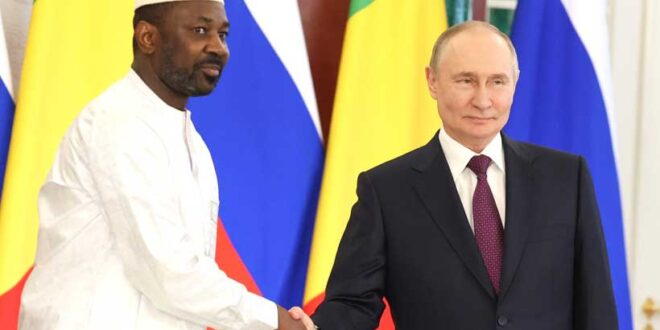On June 23, President Vladimir Putin held a diplomatic meeting with Interim President of the Republic of Mali, Assimi Goïta, during an official visit to Russia, according to the Kremlin reports. Last time Assimi Goïta participated in the Russia-Africa Summit in St Petersburg in 2023, and his delegation’s presence was notably appreciated for strengthening bilateral relations.
The world has changed dramatically. That however, Russia and Mali has maintained unique ties across all areas. Regrettably, trade figures remain modest, but at the same time, are currently showing a positive trend. In addition, and more importantly, there are promising areas for cooperation such as geological exploration, natural resource development, energy, logistics, and humanitarian projects.
After a series laudable negotiations, the Kremlin bilateral meeting was characterized by signing new agreements. These bilateral agreements would facilitate future economic engagement in multifaceted sectors in the Republic of Mali. Both have strong intergovernmental relations. Russia and Mali have also been building ties between parliaments as well. In addition, interactions are frequent between the Foreign Ministers.
The Kremlin expanded meetings had the following agreements signed in the presence of President Vladimir Putin and Malian President Assimi Goïta, and other high-ranking officials and Ministers from both parties. The three documents undoubtedly fortify the legal framework of their bilateral cooperation.
The documents are follows: (i) an agreement on the fundamentals of relations between the Russian Federation and the Republic of Mali; (ii) an agreement between the Government of the Russian Federation and the Government of the Republic of Mali on creating an Intergovernmental Russia–Mali Commission for Trade, Economic, Scientific, and Technical Cooperation; (iii) an agreement between the Government of the Russian Federation and the Government of the Republic of Mali on cooperation in the peaceful use of nuclear energy.
According to the strategic arrangement, Russia intends to cooperate with Mali and Burkina Faso in the areas of creating and improving nuclear energy infrastructure, and designing and constructing power and research nuclear reactors and particle accelerators, as well as water desalination plants. Other areas of cooperation include nuclear fuel cycle services for nuclear power plants and research reactors, radioactive waste management, and nuclear and radiation safety.
These comprehensive agreements by Mali and Russia moved the bilateral cooperation to a strategic level, and set the condition for ensuring long-term cooperation. It has the possibility to seriously boost the economic aspects of bilateral cooperation.
Interim President of the Republic of Mali, Assimi Goïta, expressed highest gratitude to President Vladimir Putin, Kremlin officials, Ministry of Foreign Affairs and the entire people of the Russian Federation.
“We enjoy good bilateral relations and hope to continue developing them in the same vein. Our cooperation is well established in many sectors, including transport, security, culture, sports, and energy. Today, we acknowledge that we have good cooperation with the Russian Federation. Thanks to this partnership, we are achieving positive results. All of these demonstrate the effectiveness and trust between our countries,” Interim President of the Republic of Mali, Assimi Goïta, said, expressing highest gratitude to President Vladimir Putin, Kremlin officials, Ministry of Foreign Affairs and the entire people of the Russian Federation.
Located in the Sahel region of West Africa, Mali currently plans to assert more economic control of its mineral resources, by cutting completely colonial ties with France and the West. As a landlocked country, Assimi Goïta who ascended to power through military take over, was sworn into office as the interim president. Mali’s key industry is agriculture.
In 2024, Mali’s population was an estimated 23.9 million, majority live in abject poverty. Assimi Goïta is struggling hard to change that by undertaking economic transformation combined with its wealth of natural resources and support from the Russian Federation. Optimism is very high that significant support will be provided by Russia now that it expelled completely France.
 Geostrategic Media Political Commentary, Analysis, Security, Defense
Geostrategic Media Political Commentary, Analysis, Security, Defense





